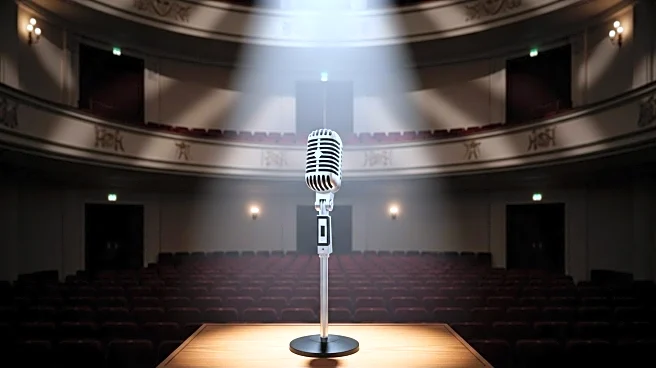What is the story about?
What's Happening?
Jane Fonda, an Oscar-winning actor and progressive activist, has relaunched the Committee for the First Amendment, a free speech initiative originally founded by her father, Henry Fonda, in 1947. The initiative was initially formed in response to the rise of McCarthyism, a period marked by heightened fears of communist infiltration in the United States. The committee's recent statement, co-signed by nearly 600 entertainment industry figures, including Whoopi Goldberg, Ethan Hawke, and Spike Lee, condemns what it perceives as a coordinated government campaign to silence critics across various sectors, including media and academia. This revival comes amid recent controversies, such as the suspension of Jimmy Kimmel's talk show by ABC, which was criticized by the Federal Communications Committee chairman. Jane Fonda, who has been a vocal advocate for various progressive causes throughout her life, expressed her concerns about the current political climate, describing it as the most frightening moment she has experienced.
Why It's Important?
The relaunch of the Committee for the First Amendment highlights ongoing concerns about freedom of speech in the United States, particularly within the entertainment industry. The initiative's revival underscores fears of government overreach and censorship, reminiscent of the McCarthy era. This development is significant as it reflects broader societal anxieties about the erosion of civil liberties and the potential stifling of dissenting voices. The involvement of high-profile celebrities and public figures in this initiative amplifies its impact, drawing attention to the importance of safeguarding free speech rights. The situation also raises questions about the balance between national security and individual freedoms, a debate that has persisted throughout American history.
What's Next?
The Committee for the First Amendment's revival may prompt further discussions and actions within the entertainment industry and beyond, as stakeholders seek to address concerns about censorship and free speech. The initiative could lead to increased advocacy efforts and collaborations with civil rights organizations to protect freedom of expression. Additionally, political leaders and government agencies may face pressure to clarify their positions on free speech and address allegations of censorship. The ongoing dialogue around these issues may influence public policy and legislative measures aimed at preserving civil liberties.
Beyond the Headlines
The revival of the Committee for the First Amendment not only addresses immediate concerns about censorship but also highlights the enduring legacy of McCarthyism in American political culture. This initiative serves as a reminder of the historical struggles for free speech and the need for vigilance in protecting civil liberties. It also raises ethical questions about the role of government in regulating speech and the potential consequences of such actions on democratic principles. The involvement of prominent figures in this initiative may inspire broader cultural shifts, encouraging more individuals to engage in activism and advocacy for free speech rights.















